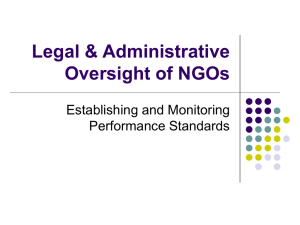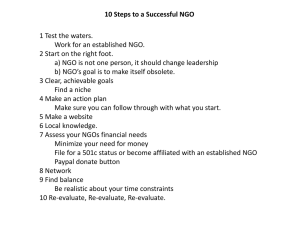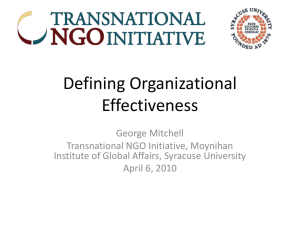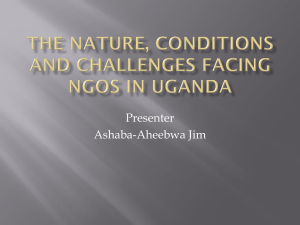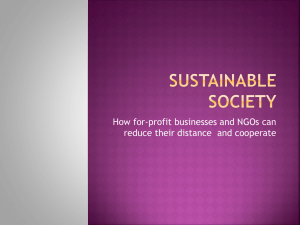Accountability, Transparency and Collection Action in Nonprofit
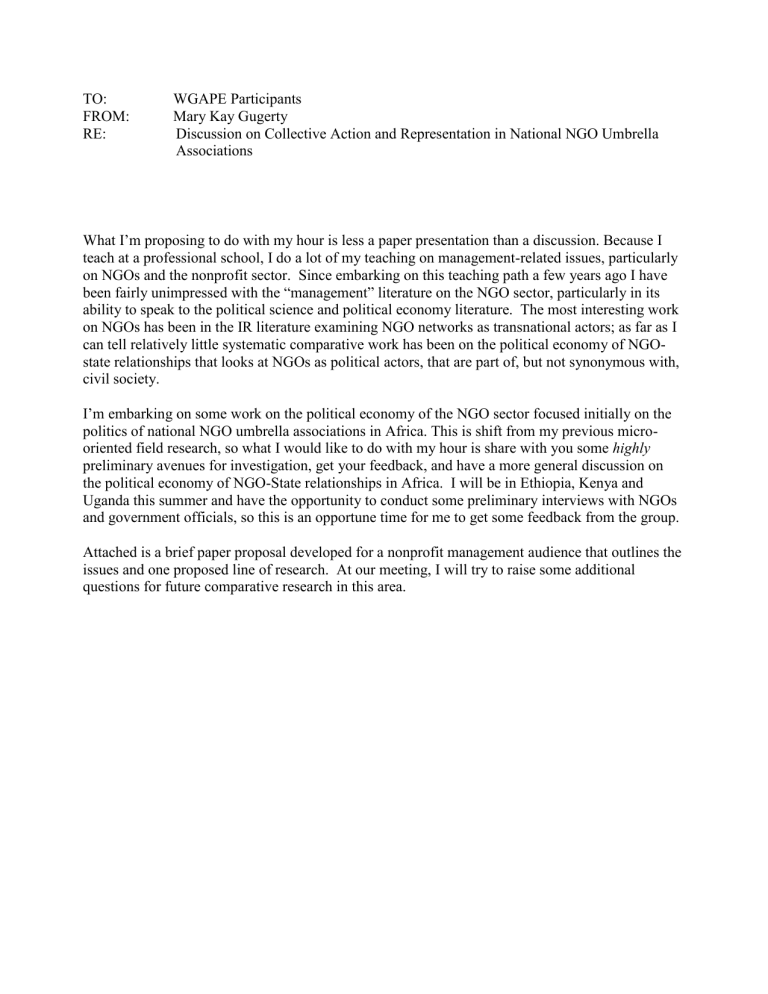
TO:
FROM:
RE:
WGAPE Participants
Mary Kay Gugerty
Discussion on Collective Action and Representation in National NGO Umbrella
Associations
What I’m proposing to do with my hour is less a paper presentation than a discussion. Because I teach at a professional school, I do a lot of my teaching on management-related issues, particularly on NGOs and the nonprofit sector. Since embarking on this teaching path a few years ago I have been fairly unimpressed with the “management” literature on the NGO sector, particularly in its ability to speak to the political science and political economy literature. The most interesting work on NGOs has been in the IR literature examining NGO networks as transnational actors; as far as I can tell relatively little systematic comparative work has been on the political economy of NGOstate relationships that looks at NGOs as political actors, that are part of, but not synonymous with, civil society.
I’m embarking on some work on the political economy of the NGO sector focused initially on the politics of national NGO umbrella associations in Africa. This is shift from my previous microoriented field research, so what I would like to do with my hour is share with you some highly preliminary avenues for investigation, get your feedback, and have a more general discussion on the political economy of NGO-State relationships in Africa. I will be in Ethiopia, Kenya and
Uganda this summer and have the opportunity to conduct some preliminary interviews with NGOs and government officials, so this is an opportune time for me to get some feedback from the group.
Attached is a brief paper proposal developed for a nonprofit management audience that outlines the issues and one proposed line of research. At our meeting, I will try to raise some additional questions for future comparative research in this area.
Collection Action in Nonprofit Umbrella Associations in Africa
Mary Kay Gugerty
Evans School of Public Affairs
University of Washington
In countries around the world, the expansion of the nonprofit sector has created tension between nonprofit organizations and governments over the control of resources and the proper scope of nonprofit activity. In many countries, the struggle for power is often couched in terms of a debate over the accountability and transparency of nonprofit organizations. This debate is hardly confined to the developing world, however; nonprofits around the world face a growing accountability challenge in the wake of corporate and non-profit scandals and increased demands for accountability and demonstrated results on the part of funders. This governance challenge has given rise to numerous international efforts to promote nonprofit accountability and transparency.
1
In response, nongovernmental organizations (NGOs) in developing countries are often turning to representative national umbrella organizations as one strategy for promoting collective bargaining power and voice with the state. Over 80 countries around the world currently have national NGO umbrella associations, though these vary widely in size, capacity and scope; at least 20 of these national associations are in sub-Saharan Africa.
2
In Africa the growth of the nonprofit sector has often exacerbated tensions between government and nonprofits. The growth of the sector often represents a threat to well-established neopatrimonial relationships that govern the distribution of resources. The increasing reliance of governments on nonprofits for service delivery further complicates the relationship. Moreover, to the extent that NGOs are connected to international organizations and networks, they may represent another perceived threat to state power in the form of increased international influence in domestic matters. Many governments in Africa have responded to the widening scope and spread of NGOs with rhetoric calling for greater NGO accountability and transparency combined with expanded attempts to regulate the sector, often through state-controlled NGO Bureaus with the power to deregister or close down individual NGOs.
Collective Action in NGO Umbrella Associations
Umbrella associations and their members must choose both the strategies they will employ in creating political space for the sector and the criteria for membership and governance in the association. Typical umbrella activities often include the development of a voluntary standard or code of ethics, mechanisms for accreditation, lobbying or negotiation with the state regarding sectoral policy, and capacity-building for members.
1 In the last five years, numerous international groups have been formed to advocate for and develop frameworks for accountability and codes of conduct for international NGOs. Sphere, Humanitarian Action Plan, One World Trust
Global Accountability Project, AccountAbility, as well as existing organizations such as Interaction and the
Independent Sector.
2 According to the NGO Association Affinity Group of CIVICUS, which is itself an umbrella organization of national
NGO associations.
Whether umbrella associations seek to engage the state on behalf of the sector or to engage in collective self-regulation, they face a collective action problem. Membership in the association implies costs to individual members-- in terms of organizational independence, organizational resources, or political risk. The association must offer the prospect of sufficient benefit to outweigh these costs. The association must also undertake monitoring or create incentives to prevent free-riding.
The story of many NGO umbrella associations in Africa in one of political repression, internal fragmentation, and weak representation of member interests. One preliminary hypothesis regarding the source of this weakness is that the dual mission of many organizations produces incompatible incentives. The goals of representation and negotiation with the state may conflict with the goals of standard setting and sectoral self-regulation. Empirically, the result is often a fragmenting of umbrella associations into splinter groups. Even without this dual mission, however, umbrella organizations may face severe challenges in maintaining collective action across heterogeneous members in a politically repressive environment.
When associations attempt both sectoral self-regulation and negotiation with the state, however, the institutional implications of these two goals may be in conflict. Representativeness, legitimacy and political power will be greater to the extent that large numbers of NGOs are members of the organization. On the other hand, self- or voluntary regulation regimes with any credibility may require some level of exclusion. Prakash and Potowski (2003), for example, show how the reputational benefits to firms from joining voluntary “green clubs” outweigh the costs of membership in terms of initiation fees and dues and are sufficient to maintain collective action among these clubs. The benefit in this case, however, cannot be universal, in that the reputational benefits of club membership do not exist if all firms belong to the club.
Self-regulation may also be effective only when institutional design includes explicit, enforceable sanctions that prevent opportunistic behavior among members. An alternative perspective suggests that codes of conduct may shape and control behavior even without explicit sanctions; informal, coercive or normative incentives may be sufficient to prevent opportunistic behavior or to shape the emergence of new norms (Scott, 1995; Parsons, 1951). Many professional associations, such as bar associations or medical associations, have been successful in designing accreditation and regulation systems with explicit sanctions to discipline members, but such associations are composed of relatively homogenous members providing relatively similar services. In large industries, some analysts have argued that private sector self-regulation based on codes of conduct without explicit sanctions appears unlikely to succeed in regulating behavior (King and Lenox, 2000). Moreover, it is unclear whether the industry self-regulation model will transfer to a sector as diverse as the NGO sector in many developing countries, since the difficulties of collective action may be exacerbated in larger, more heterogeneous groups (Olson, 1965; Ostrom, 1990). For example, Cooley and Ron
(2002) show how individual organizational incentives in NGO coordination difficult in humanitarian crises. Thus the diversity of organizations in the sector will make collective action at the national level difficult.
The tension between representativeness and self-regulation, and the challenge of heterogeneity to these organizations is evident empirically. In Ethiopia, the NGO sector until recently was
dominated by relief activities, largely run by international NGOs. These NGOs were united under the Christian Relief and Development Association (CRDA). CRDA receives a large amount of external funding from international Christian organizations, and has therefore been able to provide a relatively large range of services to its members. Since 1992, however, the NGO sector in
Ethiopia has moved away from relief and humanitarian assistance into development efforts and the number of indigenous NGOs has greatly expanded. At the same time, the NGO community began to take part in two activities under the CRDA umbrella: consultation and negation with the state over the governments NGO Registration and Regulation Proclamation and the development of a code of conduct for the sector. The ensuing debates exposed a number of fault lines in the CRDA umbrella over issue such as religious, geographic and ethnic affiliations and the willingness to advocate for policies in opposition to the state.
In Uganda, the largest umbrella association of indigenous NGOs, Deniva, has deliberately chosen not to include international NGOs in its membership and not engage with the state on policy issues, but to focus instead on capacity-building and governance within its membership. Country offices of international NGOs who were not represented by Deniva and who were interested in policy advocacy therefore had no forum through which they could advocate on behalf of policy. An alternative umbrella organization, the NGO Forum, was subsequently founded to more directly address policy issues and represent those NGOs more interested in engaging the state. The competition between the two associations, however, has tended to fracture rather than unite the sector, and weakened its bargaining power with the state.
Selected References:
Cooley and Ron. 2002. "The NGO Scramble." International Security.
Prakash, Aseem and Matthew Potowski (2003) "The Regulation Dilemma: Cooperation and
Conflict in Environmental Governance." Public Administration Review, 2004 64(2): 137-148.
Keck, Margaret and Kathryn Sikkink. 1998. Activitist Beyond Borders: Advocacy Networks in
International Politics.
Cornell University Press.
King and Lenox, 2000."Industry Self-Regulation Without Sanctions: The Chemical Industry's
Responsible Care Program" Academy of Management Journal. 43 (4)698-716.
Olson, Mancur. 1965. The Logic Of Collective Action. Cambridge: Harvard University Press.
Ostrom, Elinor. 1990. Governing the Commons. New York: Cambridge University Press.
Parsons, Talcott. 1951. The Social System . Glencoe, IL: The Free Press.
Scott, W.R, 1995. Institutions and Organizations. Thousands Oaks: Sage Publications.
Sidel, Mark. 2003. Trends In Nonprofit Self-Regulation In The Asia Pacific Region: Initial Data
On Initiatives, Experiments And Models In Seventeen Countries. Mimeo, University of Iowa Law
School.


